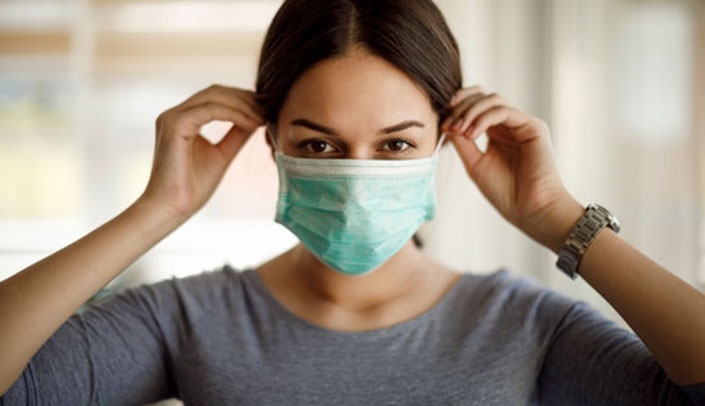If you wear a face mask for extended periods of time and have noticed changes in the health of your skin, you are not alone. As if dealing with the stress of fighting the COVID-19 pandemic wasn’t enough, now many are wondering how to deal with skin issues that can arise from wearing a mask all day. We also know stress plays a role in the development of skin conditions, therefore making it even more difficult to determine what may be causing our breakouts, rashes or bumps.
Mask guidance
Following CDC recommendations for wearing of face masks, UNMC has issued guidance for all faculty, staff and students on UNMC campuses. See the guidance.
“Maskne” and what causes it
With the increase of mask wearing for extended periods, what used to be a skin irritation more common for athletes wearing straps and helmets is now a concern for many of us. Breathing moist air, parts of the mask rubbing and prolonged sweating can create an environment for several facial skin problems.
“Maskne is a catchall term for a few different real dermatologic conditions which can affect the face especially in the setting of heat, humidity, occlusion and friction,” said dermatologist Jennifer Adams, MD. “The conditions most often dubbed as maskne right now are periorificial dermatitis, irritant contact dermatitis and acne mechanica.”
These skin conditions can lead to red rashes, acne-like bumps and flaking or scaling on the face where the mask is worn.
Skin care routines to prevent and treat maskne
If you wear masks for prolonged periods of time, there are steps you can take to help keep your skin healthy and protected. Dr. Adams gives the following advice:
- Skip the makeup. It can clog your pores and irritate your skin further. If you need to wear makeup, look for the terms “noncomedogenic” and “oil free” on the product to reduce the chances of an outbreak.
- Don’t skip moisturizer and sunscreen. Layer them lightly.
- If you know you’ll be wearing a mask for long periods, gently wash your face before and after wear.
- Avoid harsh scrubs and exfoliation. For oily skin, salicylic acid wash may be better tolerated than benzoyl peroxide washes. For sensitive skin, use a gentle nonsoap cleanser instead.
- Leave pimples alone – resist the urge to pick at them.
- Retinol/retinoid products may irritate the skin even more under a mask. While dermatologists would normally recommend these, combining them with masks can be too irritating for some people.
- If you wear a fabric mask, wash regularly and rotate it daily.
- For those not in health care, opt for masks made out of fabrics like cotton or bamboo which are gentler on the skin and less irritating.
Keep wearing your mask
While it may be tempting to forgo the mask or not wear it properly if you’re experiencing skin irritation, please resist the urge.
“The benefit of a tight fitting and well-sealed mask is that it is not open to the environment and we are less likely to transfer COVID-19. The flip side of that for skin is that a sealed, moist, humid environment with friction from the mask can contribute to blocking of the pores and skin irritation. This is why health care workers wearing more occlusive masks are at higher risk for maskne, Dr. Adams said.
“Mask wearing is vital during this pandemic to protect your loved ones and community,” she said. “The benefits of masks far outweigh the skin irritation that may result. We are always here to help support your skin so that you can keep up the important task of mask wearing to protect our community.”
If you are practicing these skin routines already and are still experiencing breakouts or other skin irritations, consider making an appointment with a board-certified dermatologist. You may benefit from a more specific treatment plan.
